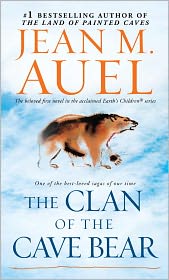 |
| Photo from bn.com. Affiliate link. |
Some believe that, long ago in our prehistory, this was not the case. Before human beings could record their beliefs in written language, there might have been a belief system based on a Mother Goddess. These speculations—and unfortunately they are just speculations—are based on art from this prehistoric period. Before we had written language, we had art, and much of this art is interpreted to support the idea of a matriarchal society and a companion Goddess-based religion.
Lately I’ve been re-reading the Earth’s Children series by Jean Auel. I first read the first three volumes many years ago, and now that there is another book to be had, I decided to pick them up again.
In these books, Auel recognizes the school of thought that believes our earliest belief systems focused on a goddess. But her presentation, to me, doesn’t stay true to this vision.
In Clan of the Cave Bear, we meet the Clan, a group of Neanderthals who take in Ayla, the too-good-to-be-true heroine of the series who is presented as a modern human. The Clan worships an Earth Mother, but their society is structured in such a way that males and females hold tightly proscribed roles. Men hunt and do manly things. Women are mothers, healers, and preparers of food. And ne’er the twain shall meet, as Ayla discovered when her more flexible brain realizes she is perfectly capable of hunting.
More disturbingly, the females are expected to make themselves sexually available at a signal from any male in the tribe. Auel attributes all these characteristics of the Clan culture to a racial memory. All the Clan hold these memories, which go all the way back to the primeval goo. A neat idea, but also far too easy an explanation for a culture that supposedly believes in a Mother Goddess, yet subjugates all its women.
The belief systems of the more modern humans, represented by Ayla’s eventual lover Jondalar, seems very different at first. Women are free to perform any duties they find appropriate to their skills, from hunting to cooking to sacred prostitution. The role of certain women in initiating men sexually aligns with many of the ideas of how a Goddess-based society might have worked. Women are also initiated by chosen men, “opened” so that male spirits can enter their wombs and impregnate them. (The idea that, at this point in history no one but Ayla was able to figure out the relationship between sex and pregnancy is another major quibble.)
Ayla finds herself in a position to express herself more freely as a woman and an individual as she travels with Jondalar, and learns more about his people and their relationship to Doni, their mother goddess.
However.
A sub plot in Plains of Passage, to me, undermines this idea of an idyllic Goddess-based belief system. A young woman in a tribe Ayla and Jondalar visit has been gang-raped by a group of thugs who have been similarly harassing the Clan females in the area. (Another aside—the Clan response to the rape of their women is generally, “But they didn’t give us the signal. If they’d just given the proper signal, we would have been happy to succumb to their demands. It’s what a good Clan woman does.” Also cringe-worthy.)
This young woman, who has suffered this horrible violation, is not treated with love and respect. Instead, her family is devastated that their virgin daughter was taken sexually before she could be properly “opened” by an approved male in the relevant ceremony. And in order to be acceptable to the eligible males in the tribe, she must be cleansed in a special ceremony—performed by a man.
This strikes me as severely ridiculous. The idea of a woman being “ruined” by rape—or, for that matter, by consensual sex—is part and parcel of a patriarchal mindset. Why in the world would a Mother Goddess place these kinds of proscriptions on women? Rules that allow a man’s actions to define a woman’s status?
To me, Auel’s portrayal of the belief systems of these people is deeply rooted in the misogynistic prejudices of current religion, particularly Western ideologies. In addition to this bit of nonsense, her tone toward the Clan is consistently positive, as if the limited roles allowed women in this culture, not to mention the virtual sexual slavery enforced upon them, is actually better than the more liberal ideas presented by Jondalar’s people. And Jondalar’s people, while making obeisance to a goddess figure, and holding the Mother above all others, still hold the idea that a woman’s worth is judged by the condition of her genitals.
This seems to be to be a far cry from the ideology proposed by many who have conjectured and theorized about the makeup of the Goddess culture. If this kind of belief system actually existed, I hope it was far more accepting of women—who are, after all, the embodiment of the theoretical Goddess—than Auel’s version.
In my own books, as I continue to work on research in the course of building stories set in the Five Lands, I’m also struggling with the way men and woman would relate to each other in societies that are extremely matriarchal, extremely patriarchal, or some combination of the two. I’m not sure I’m happy with what I’ve done so far with these ideas in Ring of Darkness. But as the stories grow and evolve, I hope to incorporate elements of a matriarchal society and how it could function in ways that don’t carry with them ingrained prejudices of our own largely patriarchal world.






0 comments:
Post a Comment